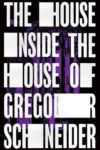Melanie Rae Thon’s latest creation, The 7th Man — the most rigorous and essential fiction I’ve encountered in the past two years. Floored me. Kept me up. Made me relive its 70-odd pages again and again….
Except to lay it on the line: happens to me with all sentences Thon — say Voice of the River, a recent novel, I devoured. Nearly three years ago and I’m still entranced by the language … images that never existed in the text sneak into my thoughts with the oddest triggers … the movement of a dog among trees, the stale weight of a long winter. Thon, the quietest American literary giant scribbling so diligently away — her fingertips breathing a cadence sweet like no other.
And now The 7th Man. A diminutive book, delicately wrought. Deceptively simple, though a juggernaut of cultural and spiritual urgency. Subversive in its magnanimity. A story of radical gratitude triumphing amidst humankind’s horrific compartmentalizations, amidst the sterile systems we’ve substituted for interpersonal ethics and the vigorous, yet rewarding, demands of striving for a society of scrupulous equanimity.
Valen Arnoux, our first-person narrator. One of seven men who carry out death sentences. A team of guards. A living machine. A crew of implementers with the darkest and most intimate of surgical tasks. Arnoux, ostensibly one interchangeable part of a well-oiled team required to efficiently restrain and cart and deliver convicted killers from the death row cell to the lethal injection chamber.
You can’t believe how graceful we are, six men moving as one, each sensing all others—but not watching: the eye need not see the hand to see how the hand moves, to feel what the hand is doing:
Graceful, that is, in thoughtlessness, in rote unison. Grace — often an attempt to name that which protects us from perpetual epiphany, from watching too clearly too often. Arnoux has partaken, as a member of his unit, in 131 executions. He wants to believe in the grace provided by the anonymity of being a cog in the infallible wheel of justice. He wants to believe his actions are not central, that he may be limb or nerve or sensor for this apparatus, but never nucleus, never soul.
We are watching the 7th man, the one between, the heart at the center, the one who brings us here, strange and beautiful: we are dancing the man down the hall, strapping the man to the gurney:
The one who brings us here. That force which focuses the six positions. Make one of seven. Though seven guards required to warrant that six men operate as one man killing one other man. All seven guards must be able to perform each of the six positions. One extra — maybe for days off, for reprieve — but certainly seven, because when the system hasn’t that day supplied for them an actual nucleus, a legitimately convicted 7th man, the guards rehearse, taking turns as the 7th, performing the role of surrogate morituri.
It is the 7th day and I am the 7th man — Everett, Mick, Sam, Riley — Neville, Troy — there’s no one else: I wake into the day and know this:
Just as it is not the guards’ job to question the system, to consider the humanity — or the irony — of this man or this man that they are delivering so that he might be destroyed for the destruction he’s wrought, it is not their job to question why, or when, they must pretend to be the one between, the heart at the center.
Seven men, in order to rehearse reality — to turn six beings into one being, to turn one being into nonbeing. The arithmetic is important, in that it isn’t. Like that ubiquitous bumper sticker: Why do we kill people who kill people to show that killing people is wrong?
Arnoux’s having more and more difficultly buying the slippery mathematics of his programming: he is the 7th man, yes, not just when he is or just not when he isn’t. How can bureaucracy, how can language, make such physical distinctions? When Arnoux is splayed on the gurney, what concrete truths can distinguish him from the men he’s delivered for lethal injection?
But the hand that touched can’t untouch, and now am found, the voice that entered shall not cease:
Absorber of disparate, un-solved and inconclusive narratives, Arnoux’s body reads those he kills as his mind struggles to process. What has this man or this man or this man sensed that he must be delivered for death, delivered as the system decrees? Who is he? What can anyone’s life be, or do, or become, to deserve nonlife?
We need no philosophers here, why and why, no counterfactuals — your mother, your father, and one eye gone:
No philosophers. The philosopher is the counterfactual. The counterfactual is that which seeks to prove fact via equation. Fact, truth, faith — these are not intellectual belief systems that can be captured by the didactics of denotation. One eye gone is the loss of dimension. But that is what is required here, on death row, required by Arnoux’s rotating station. To intimately touch but not to be touched intimately. To hear but not be heard. One eye gone. Though even when one eye is gone, the body finds other ways to see, to sense, to make sense, to generate memory, the rehearsal of life, the performance of a quantified self.
Arnoux wakes into the day of his pretend death to find he suddenly cannot not think. That he cannot be limb without heart, nerve without mind.
It is dangerous to think: memory will not help you:
The “therefore I am” — Arnoux’s blooming crisis. The idea of nonbeing is the heart of being. Death brings life’s reason to life, allows life to not only be felt, but qualified, contextualized, even in and through all its polyvalent chaos. Is “I am” something that can be pretended? And his crisis is more profound than that even, than the rules of grammar. It is one of disproportion, of pairing the unpairable and reading the sentence from the middle. If memory is thinking, then thinking is remembering, and what one remembers is why one must be punished or not punished … to, what, erase those memories, unsay those sentences uttered to Arnoux as he pretends not to hear? Or transfer them to that place all memories live, in language, that elusive organism that no one person can own but we all somehow must share?
131 men: you can’t scare me now: I am always afraid, before and after:
Arnoux speaks to himself and to the reader and to the dead at once, as if as one. But fear is not merely a declaration, our narrator begins to discover — or remember — the more he admits his senses into his mind; no, fear is the beginning of authentic questioning. Fear—not the primal piss-yourself-tooth-and-claw species of biology hackling down other biology, but an admission that something is paradigmatically faulty in the ontology-philology equation, that life and death, beginning and end, you and me, afraid and scared, nerve and nerve, narrator and reader, can’t be measured or weighed. How then to truly value one’s own heart without valuing the complexity and sublime sentience of other hearts?
A free man, it’s true — but at 5:00 I’ll be in the cell, at 6:06 strapped to the gurney:
Arnoux wakes into the day of his pretend death. He’s been here before and he will be here again, but this thought of repetition no longer comforts and estranges him. Arnoux’s logic betrays him, in that, suddenly, it can’t help him not see clearly.
“The problem of storytelling,” writes Leonard Michaels, “is how to make transitions into transformations, since the former belong to logic, sincerity, and boredom (that is, real time, the trudge of “and then”) and the latter belong to art.” Or we transform this quote as The 7th Man so eloquently has: the problem of being one person is how to make stories into storytelling, as the former belong to individuals, conventions, and tired, narrative linearity (that is, the formalized mechanics of a singular mind pretending to move through an orthodox, singular, material existence) and the latter belong to the all of humanity, to the all of all time. Time in no graspable sense. Time in its awesomeness, un-spaced. That tremendous force that reduces Arnoux’s concerns to the now, to the raw senses, to material survival in a world that refuses to be neatly categorized and mapped.
I wake in the house alone — a man has a choice, a man has his freedom: I can go to work, die like a man, or I can stay here: free to drive to my brother’s house, hide in his basement — make the damp room my home, my hole — life without parole: solitary confinement:
Every rational proposition that Arnoux proposes to himself, to the reader, ends in paradoxical defeat. Is this, however, a defeat of language, a defeat of story, or a defeat of physical reality? The arithmetic cannibalizes itself, but, as it does, the cadence, the poetry, is loosed from the form. One eye gone is not the loss of the sense of dimension, for the phantom we envelopes every I. Memory is the nemesis of fact. Reality is a rehearsal of itself. Arnoux’s sense of self can no longer hide within the team. Death cannot be picked up, put down, walked away from.
“Someone has to die so that the rest of us shall value life more,” said Virginia Woolf, and Thon deftly animates this theorem — not simply by constructing a gorgeously lyrical, demonstrable parable, but by resurrecting the strange and beautifully timeless problem of narrative as alive in its own right, a sentient thing squirming on the gurney of the printed page, waiting to be carted, with all its messy memories, but … to where?
Arnoux, then, faced with the new. Arnoux as our new reader reading the reader. He is out of time, or at least the Arnoux who is little more than a narrator of his own existence is out of story-time. A threshold has been reached. The old, binary I am narrative that’s been sustaining him (I am guard, not prisoner; I am punisher, not punished; I am toucher, not touched; I am ultimately protected by my team, anonymous and blameless by virtue of my mechanization) has withered.
131 men: I heard your last words; your voices entered my skull, how sweet the sound: I love the sound: I go listening for you everywhere:
Words last. They have their own sublime system of calculating. One of six, or seven? Or one of 131? Or all of them? The mathematics that should formally protect Arnoux, that displaced him up until now, that allowed him to hide within the workings of his team, that should secure his place in the system, can’t. They fail to delineate his memories from the memories of those lives his life has played a part in physically concluding … spiritually: those beings, their language, their symbolic noises, refuse to not-be along with the destruction of the bodily senses that partially originated them.
I go listening—
The human doesn’t listen because there isn’t sound; the human listens because all there is is sound, all there is is so much sense we’ve reduced to such strict sense.
how sweet the sound: I love the sound
Thon’s double nod here to synesthesia and Amazing Grace is nothing less than the acknowledgement of poetry as salvation, poetry as allowing the reader access to a greater reality than the pretend-sion of formulized narrative and systematized death. Arnoux sees that his only chance of pardon, from commuting the sentence of strict logic, which brings inevitable insanity, is to taste of the words, to feel around the boundaries. But … how? First he must absorb that in-sanity, that cacophony, that, as Barry Hannah called it, “orchestra of the living.”
Arnoux is not the 7th man. The reader is not the 7th man. He’s only sometimes Woolf’s proxy some one, the make-believe heart at the organism’s pulsing center—
This is book review: you want me to value The 7th Man for you so you don’t waste your time coaxing this story from its cell, wrangling it into submission, carting it to a conclusion that may or may not redeem itself—
?
An apostrophe answer for an apostrophe question. The self must die. Gracefully or not. Thon tries to remind us, but it is up to us to move the narration along, to realize this reminder already belongs to us, always did. Die. Disperse. The reader as ultimate self or the narrator as ultimate self, it makes no difference—both are formalisms either molted or rotted and clinging. Value is or isn’t; that is the being of value. Value expands on its own magnificently rickety or phantomly firm terms.
“Someone has to die so that the rest of us shall value life more,” cried Woolf, and The 7th Man replies, “Us. Us. Us.”
Nate Liederbach is the author of Beasts You’ll Never See (Noemi Press), the collections Doing a Bit of Bleeding (Ghost Road), Negative Spaces (Elik), and the forthcoming Tongues of Men and of Angels: Nonfictions Ataxia (sunnyoutside). He lives in Eugene, Oregon, and Olympia, Washington.
This post may contain affiliate links.








